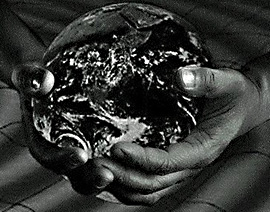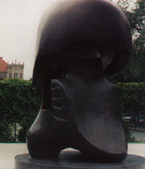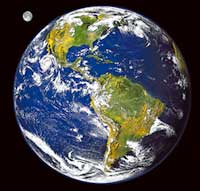
Shaped by the very instruments with which we try to shape the world, human ingenuity may be redefining who we are.
By 1900, the 'modern life' was being defined by the remorseless spread of the new technologies of energy, transport and communication, and by revolutionary notions of the human mind and of time and space. Cubism seemed to provide an art that embraced the new situation."
Kemp, Visualizations, p. 98.
Machinery | Automation vs. mechanization | politics of technology | industrialization | Imagery | fine technology | religion
Mechanization takes Command
material & spiritual changes in society
1800-1980
* * * * * * * *
“Men are grown mechanical in head and in heart, as well as in hand.”
Thomas Carlyle (1829)
“By 1844 the machine had captured the public imagination. The invention of the steamboat had been exciting, but it was nothing compared to the railroad. A national obsession.... The entire relation between man and nature is being transformed.”
( p. 195, Machine in the Garden. )
Contrasting ways of making products.
| Dates |
Manus
- hand |
|
Auto
- self |
|
1570 |
Hans
Lippershay, telescope |
||
|
1658 |
Robert
Hooke, spring drive for watches |
||
|
1659 |
Christian
Huygens, maritime chronometer |
||
|
1680 |
Newton's "inverse
square law" |
Minute
hands on clocks |
|
|
1712 |
Thomas
Newcomen, steam engine |
||
|
1745 |
Vaucauson's,
self-acting silk loom |
||
|
1765 |
John
Harrison, longitude clock |
James
Watt, condensing steam engine |
|
|
1804 |
Richard
Trevethick's, steam locomotive |
||
|
1805 |
Jacquard's
punch-card controlled loom |
Mechanization began to spread during the 900s and morphed into industrialism in 1700s.

Do tools as they are used and their associated tool complexes possess their own politics?
Two possible, yes, answers:
By politics, I do not mean the accompanying political order in which tool complexes are exploited, such as railroad empires.
That is because with the coming of the industrial revolution there emerged a move away from monarchy and oligarchic order to a more commercial and dispersed idea of power sharing.
1800 -1859
The French group of thinkers called Physiocrats argued that land was the basis of all wealth and thus that its ownership was a means of altering power among societies competing members. See property.
The ideal of laissez faire - [to allow to make or do] allowance to make products emerged from the success of the French Revolution to replace the older monopolistic traditions of mercantilism.
The idea of Utility, Utilitarianism,
Other competing ideologies emerged with respect to the control needed to "tame" the machinery that was reorganizing labor. These concepts were:
syndicalism, anarchism, and Socialism
British textile manufacturing, changed family labor and the venue or locus of productive work became focused in industrial factories, as opposed to the home.
Machinery | Automation vs. mechanization | politics of technology | industrialization | Imagery | fine technology | religion
Eli Whitney & the myth of production:
the use of standardized, interchangeable parts, in a particular sequence.
Industrialization -- coke process for coal, iron production, textiles, railways, electromagnetic induction, telegraph, lights (1879), automobile (1885).
Vocabulary
alienation -- control devices -- repairmen -- trouble shooting -- unintended consequences -- design flaws -- manufacturing errors -- planned obsolescence --
Are people like resources, like replaceable parts in a machine, or something else?
 Pacey 9: Railroad
empires race across Asia
Pacey 9: Railroad
empires race across Asia
Kranzberg: The
Discipline of the Machine
15 The Mass Production Farm 4 field system & machinery
in the garden
Pursell
8 J. B. Eades: engineer & entrepreneur
wealth produced by war machinery
This
is the sculpture commemorating the spot at the University of Chicago where the
first nuclear chain reaction occurred on the December 2, 1942.
![]()
Reflection: What beliefs or biases lie behind our principles?
 American Technology:a change
American Technology:a change
from thrift to conspicuous consumption
from performance to privilege
Textile manufacture & family values to corporate values
Railroad & Steamship networks standardized sun-time
Iron & Steel making changed matter & space
production & efficiency
Populism vs. Progressivism
from whale oil to kerosene (petroleum)
Blast furnaces, standardized screws, & copper wiring
Machinery | Automation vs. mechanization | politics of technology | industrialization | Imagery | fine technology | religion
Political parties that embraced technological reforms
- Abolitionists - opposed to slavery
- Workingmen's or labor party - eight hour day
- Free Soil Party was opposed to slavery in the west
Social behavior and class order was altered by industrial organization:
- means of production as opposed to material wealth
- Labor vs. Capital
- craft vs. industrial unionism
![]()
Imagery
the Virgin & the Dynamo
How did automation arise?
confusion & controlsugar mill, the West Indies
Each of these inventions or discoveries and subsequent patents created a suite of techniques and implements that were linked by electricity and control devices.
One unexpected outcome of automation was to reinforce a trend inherent in the Middle Ages, but more pronounced as the pace of change quickened due to transportation and communication's technology.
Machinery | Automation vs. mechanization | politics of technology | industrialization | Imagery | fine technology | religion
Misplaced sentimentality:
origins of postmodern culture lie in the separation of the image from the facts that began to be accelerated by the graphic revolution
inventions: automobiles, Kinetiscopes, & vacuum tubes
service work: marketing - maintenance - insurance
advertising, imagery, industrial psychology
horsepower internal combustion engine model
Technology does not create these conditions but the reliance on machines and electronics accentuates people's ability to engage in behavior that promotes:
reification - to make real what is fictional
nihilism - absence of meaningful or constructive drives
narcissism - confusion of the self-image with others
Machinery | Automation vs. mechanization | politics of technology | industrialization | Imagery | fine technology | religion
Fine technology as the origin of mechanization and automation.
Automatons & Automation
issue of control & problem
of performance
17th century --- 1950-80
iron & coal --- silicon
mines --- manufacture
flooding --- electronics
pumps --- cybernetics
“the drive for power” & the power elite
postmodern, secular influences may transcend automation:
• There are social, political, behavioral changes introduced by the technical demands of automatic machinery.
• USA patent office protected some inventions, European parliament, Japanese planning.
• The origins of mechanization reveal the depth of our beliefs in the illusion that we persist in betting on progress, technological advance, and material well-being because new inventions will solve persisting problems. Examples of this are:
- flight in conquering space.
- drugs in extending life and decreasing morbidity.
- birth control in reducing unwanted pregnancy.
- petroleum in replacing whale oil.
- coal in replacing timber as a fuel source.
- concrete for building.
- electricity in replacing coal gas and kerosene for lighting.
- refrigeration for preserving food replacing salting and pickling.
Machinery | Automation vs. mechanization | politics of technology | industrialization | Imagery | fine technology | religion
Modern, organized religion's social influences:
social political technical schools & orphanages diocese for order pipe organs printed sutras, bibles & Koran's no tax on land clock for prayer hospitals & infirmaries tithes from members art & architecture charitable giving
- hospitals & schools parishes
- art of perspective
- philanthropy neighborhoods
- scientific ideas
![]()
Machinery | Automation vs. mechanization | politics of technology | industrialization | Imagery | fine technology | religion
Course overview and Technological Complexes
- A timeline of crucial technologies, tools and inventions
- Automated technology shapes our expectations
- Chronological Periods of tool use
- History of Technology course Described
- Introduction to technology and keystone tool complexes
- Kranzberg's Laws of technology
- Pacey's three planes or dimensions of tool use
- Political influences of inventions and tool complexes
- Power of Technology
- Technology alters our values!
- Technology defined
- Time and the relation of clocks to tool
- Final reading
- Final Exam
![]()
Pursell | Pacey–World| Pacey–Meaning | Tenner | Postman | Eberhart | Snow | Kaku
 |
||
|---|---|---|
| Tools of Toil: what to read. | ||
| Tools are historical building blocks of technology. | ||
![]()
Machinery | Automation vs. mechanization | politics of technology | industrialization | Imagery | fine technology | religion